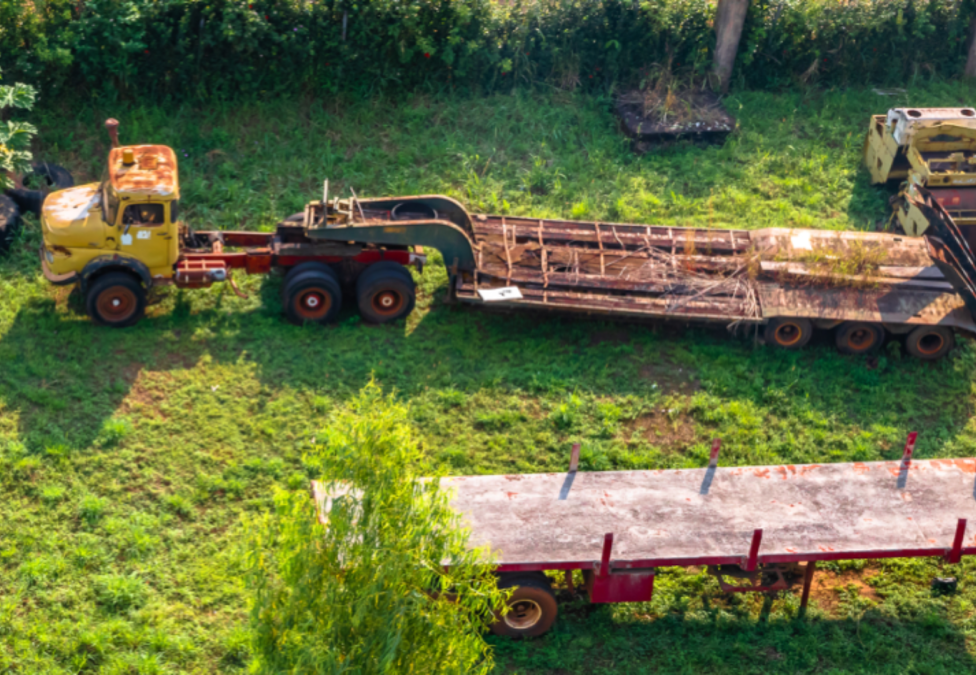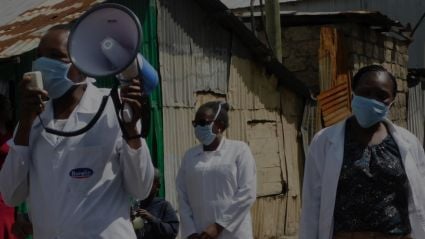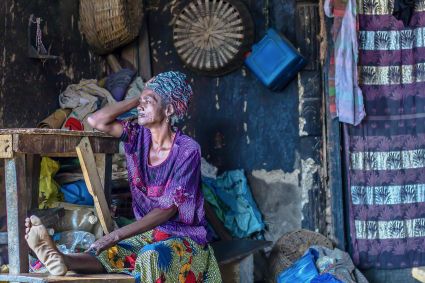
Lockdown restrictions to mitigate COVID-19 had severe impacts for farmers in Nigeria, delaying planting and increasing the costs of inputs. Abiodun Jamiu reports from Kwara State.
First the lockdown, then the floods
Salaudeen Abdulrasaq grew up in Omoniju, a predominantly farming community in Kwara State in north-central Nigeria. He is a farmer who plants maize, yam, cassava, and rice, and his income from this work helps him take care of his immediate and extended family.
Late in December 2019, months before Nigeria recorded its first case of coronavirus, Abdulrasaq says he was optimistic that earnings from his produce would be higher than in previous years, and that he was well-prepared for the growing season in February.
But his prospects changed when the federal government ordered the cessation of movement across the country as one of the measures to contain the spread of COVID-19. Although workers providing “essential services,” such as groceries and healthcare, were exempt, Abdulrasaq discovered that agricultural laborers were unable to leave their homes to work on his farm.
“COVID-19 crept in when we were all preparing for the new planting season,” he says. “Although the government allowed us to continue with our farming activities, laborers were unable to leave their homes to work for us, and there is little we can do all by ourselves. I planted rice then. It is still there lying fallow because we couldn’t get agrochemicals to control pests,” Abdulrasaq explains in Yoruba, a language spoken across West Africa and most prominently in southwestern Nigeria.
To make matters worse, a period of drought was followed by heavy rainfall. The fifty-four-year-old farmer says the resulting floods wreaked havoc on his farm, and most of his produce was washed away.
“By the time it rained, the surge of floodwater also swept a lot of farms away, especially those at the riverbank. I visited my other farm at the riverbank to ascertain the level of destruction caused by the flooding. I nearly cried. I was expecting two hundred bags of maize this year, I just recovered twenty bags.”
Abdulrasaq’s story is not an isolated case in Kwara State.
Rasheedatu Hanafi, who grows cassava, pepper, corn, and yams, also started the year with high hopes. But she has experienced heavy losses during the COVID-19 pandemic. During the lockdown, she was confined to her house, as were the laborers she relies on, resulting in late planting of her crops.
“The laborers that should come to work for us could not leave their homes as a result of the lockdown. We had to literally stay in our house.” Since then, she says, the situation has only gotten worse. “Some of my harvest and even yam tuber for planting yam turned rotten. We should clear the weeds as well, but we could not. They have now taken over the crops we planted.”
National support measures not reaching rural farmers
In March, President Muhammadu Buhari directed the implementation of a three-month repayment moratorium for all TraderMoni, MarketMoni and FarmerMoni loans, to cushion the impact of the pandemic on small and medium-sized enterprises (SMEs). Buhari also proposed that the social register of the poor “be expanded from 2.6 million households to 3.6 million households” and established a similar repayment moratorium on all government-funded loans issued by the Bank of Industry, Bank of Agriculture, and the Nigeria Export-Import Bank.
Meanwhile, the president directed the Minister of Agriculture and Rural Development, the National Security Adviser, the Vice-Chairman, the National Food Security Council, and the Presidential Fertilizer Initiative to work with the Presidential Task Force on COVID-19 with the aim of minimizing the impact of the pandemic on this year’s farming season.
For its part, the Central Bank of Nigeria (CBN) announced a credit relief package of N50 billion (about US$137 million) for businesses heavily impacted by the pandemic. The CBN Governor, Godwin Emefiele, said the relief package would be for households, SMEs, agricultural food chain businesses, airline operators, service providers, hotels, and healthcare merchants.
However, these efforts have not reached the poor rural communities in Omoniju. Despite his losses this year, Abdulrasaq says he has not received any government support. Husseini Adio, a soya bean farmer who has also suffered significant losses, says the same.
“There is no help at all,” Adio says. “The little money we had was what I used to take care of my family during the lockdown.”
COVID-19’s impacts extend beyond the lockdowns
On the 3rd of September, the Nigerian government announced the third phase of the gradual easing of the lockdown. But farmers continue to face difficulties.
Farmers interviewed for this article say they now have to deal with increasing prices for agricultural inputs such as fertilizers, herbicides, and seedlings because the lockdown has also affected the import and transportation of these products. Poor harvests and high prices mean that an additional 5 million Nigerians could face food shortages, according to a report from the Food and Agricultural Association of the United Nations.
As Abdulrasaq and Hanafi did, Adio also had ambitions for this year that will now go unrealized.
“I could not go ahead with most of the things I had planned for the year,” he says. “I planned to go into large scale cassava and yam farming, but they all remained dreams because the harvests were very poor.”










